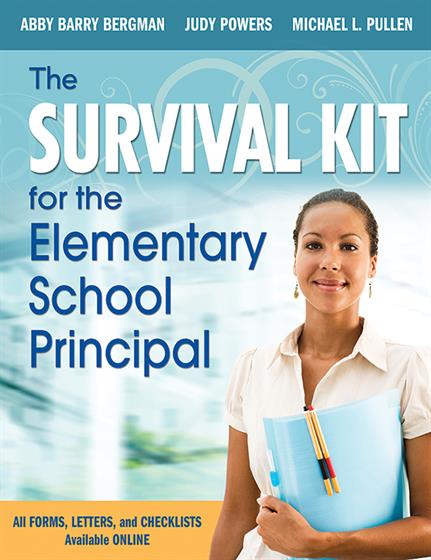About This Resource
Acknowledgments
About the Authors
1. Your Role as Principal: "All Things to All People" or "Principle-Centered Leadership"
The Nature of the Principalship
Define Your Own Belief System
Systems Thinking, the Learning Organization, and Strategic Planning
Instructional Leadership
The Importance of Diplomacy
The Need for Positive Community Relations
Learn From Experience
Effective Time Management Practices
Maintain Perspective
2. How to Plan for the School Year: Setting Goals and Maintaining Focus
The Context for School Goals
The Power of Goals
Goals Should Make a Difference
Setting Goals: Broad-Based Involvement
The Elements of Well-Designed School Goals: SMART Goals
Keep the Ball in the Air
Reporting on Goal Fulfillment
3. Shared Decision Making: The Key to a More Effective School
What Is Meant by Shared Decision-Making?
What Are the Benefits of Shared Decision-Making?
What Do Effective School Leadership Groups Do?
What Steps Are Required to Establish a School Leadership Team?
What Is the Relationship of the Leadership Team to the Larger School Community?
What Are the Skills Required for Effective Team Meetings?
The Role of the Principal in Shared Decision-Making
How to Assess the Effectiveness of a School Leadership Team
4. Improving Teacher Observation and Evaluation
The Purposes of Supervision and Evaluation
How to Establish a Positive Climate for Teacher Supervision
How to Clarify the Criteria for Supervision and Evaluation
Achieving a Balance Between Formal and Informal Observations
Reviewing Professional Development Plans
The Pre-Observation Conference
How to Conduct Effective Teacher Observations
The Post-Observation Conference: A Time for Sharing and Learning
Other Means of Observation and Evaluation
How to Make the Most of an Annual Evaluation Conference
How to Make Effective Decisions About Rehiring Teachers
How to Deal Effectively With the Marginal Teacher
Evaluating the Supervisory Process
5. The Principal's Role in Curriculum Development and Renewal
What Is the Curriculum?
The Content or "Course of Study"
The Methods or Techniques to Be Used
Establishing a Timeline for Examining the Curriculum
A Process for Curriculum Renewal
Preparing a Curriculum Document
Curriculum Articulation
Curriculum Supervision and Accommodating Teacher Choice and Flexibility
6. Assessment in the Elementary School: Purposes and Practices
The Purposes of Assessment
A Few Useful Definitions
Assessment Versus Testing
Gaining Consensus on Learning Outcomes
Aligning Assessment to Instruction
Different Assessments for Different Needs
Steps to Follow in Designing Assessments
A Balanced Approach to Assessment
7. Using the School Testing Program to Good Advantage
The Purposes of Standardized Testing
The Kinds of Standardized Tests Often Given in Elementary Schools
Effective Ways to Approach the Testing Situation
Administrative Responsibilities in the School Testing Program
Helping Children Perform Their Best on Standardized Tests
Effective Analysis and Use of Test Results
Understanding the Limitations of Standardized Tests
"Value-Added" Assessment
Reporting the Results of Tests to Parents and Students
8. Reporting Student Progress to Parents
First Things First: Getting to Know Students
When Should Student Progress Be Reported?
Clarifying Reporting Practices With Teachers
Helping Parents Understand the School's Reporting System
Improving Progress Reports
Reporting Progress in Special Subject Areas
Tips and Techniques for Holding Effective Parent Conferences
Student Self-Evaluation
9. Administering Effective Programs for Students With Special Needs
The Role of the Principal in Overseeing Special-Education Services
Identifying Special Needs of Students
Developing a Continuum of Services for Students
Inclusion and Its Implications
Creating a Pupil Support Team
Prereferral Strategies and Response to Intervention
Procedures to Follow in Section 504 Referrals
Referral for Special-Education Services
Dealing With the Outcomes of a Special-Education Evaluation
Discipline Regulations and Special-Education Students
Administering English-as-a Second-Language Programs
Administering Gifted and Talented Educational Programs
Staff Development Needs in Dealing With Unique Learners
Assessing the Effectiveness of Programs to Meet Special Needs
10. Student Discipline: Approaches, Alternatives, and Solutions
Causes of Discipline Problems That Principals Are Likely to Encounter
Approaches to Effective Discipline
Elements of a Preventive Discipline Program
Advice for Teachers About Classroom Discipline
The Principal's Role in the School Discipline Program
The Importance of Parent Communication
Alternatives in a School Discipline Program
11. Improving Your School's Professional Development Program
The Need for Ongoing Professional Development
How to Begin: Conducting a Staff Development Needs Assessment
Staff Development and Behavioral Change
The Principal's Role in Devising a Staff Development Program
Implementing an Effective Staff Development Program
The Faculty Meeting as a Forum for Professional Development
Staff Development for School Service Personnel
12. Promoting Effective Communication: Internal and External
The Importance of Effective Communication
Keeping the School Staff Informed
Obtain Requested Information in an Organized Fashion
Electronic Communication With the School Community
Keeping the Parent Body and the Community Informed
Face-to-Face Communications
Tips on Preparing Presentations
Establishing a Network of "Key Communicators"
The Written Letter: A Lost Art
13. Promoting Positive Parent and Community Relations
Begin With Your Own School Community
Developing a Unity of Purpose
The Importance of Availability and Visibility
Working With a Principal's Advisory Council
Establishing Procedures for Handling of Parental Complaints
The Importance of the Role of the School Secretary
Dealing With the Media
Becoming Skillful at Creating Positive Publicity for Your School
14. Technology and the Elementary School Program
Clarifying the Purposes of Technology in the School
Planning for Effective Use of Technology in Schools
Integrating Technology Into the General Curriculum
Technology and Educational Reform
Planning for Appropriate Staff Development for Using Technology
Using Online Services
Evaluating Content and Software Programs
Ensuring the Proper Use, Maintenance, and Inventory of Equipment
Evaluating the School Technology Program
15. Effective Budget Preparation and Control
Advance Planning: The First Step
Preparing Budget Documents
Budget Review and Approval
Implementing and Controlling the Budget
Securing Alternative Means of Funding in Your School
16. Maintaining a Clean, Safe, and Secure School Environment
Caring for the School Building
Maximizing the Use of Building Space
Working With the Custodial Staff
Securing, Storing, and Maintaining an Inventory of Custodial Supplies
Maintaining a Safe and Clean School Site
Improving the Appearance of Indoor Spaces
Long-Term Planning and Capital Projects
Safeguarding School Equipment and Materials
School Safety and Emergency Planning
17. Developing and Implementing Effective Class Placement Policies
Fair and Appropriate Organization of Classes
Inviting Parent Input Into Class Placement: Benefits and Drawbacks
Developing Class Lists
Forming Incoming Kindergarten Classes
Dealing With the Retention of Students in a Grade
Announcing Class Placements to Parents
Handling Parent Complaints About Class Placements
Placing Students Who Enter During the School Year
Reviewing and Evaluating Class Placement Practices
18. Effective and Creative School Scheduling Practices
Setting Goals for the School Schedule
The Effect of the Schedule on the Climate of the School
Defining Premises, Assumptions, and Contractual Considerations
Models and Approaches for School Scheduling
Getting Down to Business: Developing the Master Schedule
The Trend Toward Year-Round Schooling
19. Staffing and Hiring: Critical Decisions for Principals
Projecting Staffing Needs
Forming a Selection Committee
Developing a Candidate Profile
Recruiting Suitable Candidates
Paper Screening
Developing Interview Questions
Developing an Interview Schedule
Conducting Interviews
Checking References
Making a Hiring Recommendation
Notifying Applicants of Their Status
Announcing Hiring Decisions to the School Community
Orienting New Staff Members
Evaluating Hiring and Orientation Practices
20. Fostering a School Culture: Traditions and Ceremonies
Making Schools Great and Memorable With Traditions and Ceremonies
Developing a School Culture
Planning for Ceremonies and Maintaining Traditions
Examples of School Traditions and Ceremonies
Passing Down School Traditions From One Generation to the Next
Index




